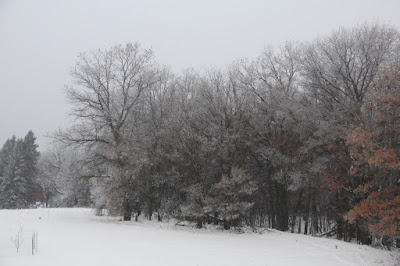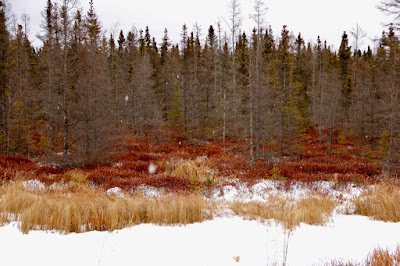We've finally managed to get 90% of this year's (plus almost all of last year's) leaves cleared from the driveway, limiting the likelihood that we'll jam the snowblower's auger or discharge chute when it comes time to clear this Winter's snow from that same drive. Winter, at least the cold weather part, has started early this year. Although we haven't yet needed to shovel or blow cold from the drive. Oak leaves, on the other hand, seem to fall during three seasons, probably because they do, but the number remaining on the branches diminishes greatly by the end of December.
 |
| late December, mostly leafless oaks
Photo by J. Harrington
|
In the course of learning about oak leaves we discovered what's become one of our favorite words: marcesence, "the retention of dead plant organs that normally are shed." Of course you know that one of the better ways to pull carbon dioxide, a green house gas, from the air is through the photosynthesis of trees. From some of what we've read over the past few months, it doesn't make much difference which trees we plant but it does make a difference whether we plant them in monoculture plantations (not good for biodiversity) or in analog forests of mixed species and heights.
 |
| Winter tamaracks
Photo by J. Harrington
|
We've noticed that we find the aesthetics of a more open understory without buckthorn to be much more appealing than areas where we've not yet pulled most of that invasive species. We're undecided about our aesthetic preferences of the clear, barren branches of maples compared to the partially leafed oak branches. We do note that neither evokes the melancholy that late season tamaracks call forth. Perhaps we'll spend some time this Winter looking at and comparing oak branches with tamaracks and see if we gain any insight. During the past few years we've learned that there is much more to trees and forests than we ever imagined. How about you?
Learning the Trees
Before you can learn the trees, you have to learnThe language of the trees. That’s done indoors,Out of a book, which now you think of itIs one of the transformations of a tree.The words themselves are a delight to learn,You might be in a foreign land of termsLike samara, capsule, drupe, legume and pome,Where bark is papery, plated, warty or smooth.But best of all are the words that shape the leaves—Orbicular, cordate, cleft and reniform—And their venation—palmate and parallel—And tips—acute, truncate, auriculate.Sufficiently provided, you may nowGo forth to the forests and the shady streetsTo see how the chaos of experienceAnswers to catalogue and category.Confusedly. The leaves of a single treeMay differ among themselves more than they doFrom other species, so you have to find,All blandly says the book, “an average leaf.”Example, the catalpa in the bookSprays out its leaves in whorls of threeAround the stem; the one in front of youBut rarely does, or somewhat, or almost;Maybe it’s not catalpa? Dreadful doubt.It may be weeks before you see an elmFanlike in form, a spruce that pyramids,A sweetgum spiring up in steeple shape.Still, pedetemtim as Lucretius says,Little by little, you do start to learn;And learn as well, maybe, what language doesAnd how it does it, cutting across the worldNot always at the joints, competing withExperience while cooperating withExperience, and keeping an obstinateIntransigence, uncanny, of its own.Think finally about the secret willPretending obedience to Nature, butInvidiously distinguishing everywhere,Dividing up the world to conquer it,And think also how funny knowledge is:You may succeed in learning many treesAnd calling off their names as you go by,But their comprehensive silence stays the same.
********************************************
Thanks for visiting. Come again when you can.
Please be kind to each other while you can.
No comments:
Post a Comment